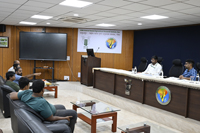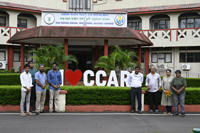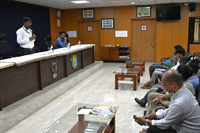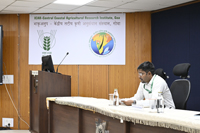
ICAR-CCARI Hosts Stakeholder Interface to Promote Ornamental Aquaculture through Cooperative Models in Goa
ICAR-CCARI Hosts Stakeholder Interface to Promote Ornamental Aquaculture through Cooperative Models in Goa
A stakeholder interface meeting was held on 26th June 2025 at ICAR-CCARI, Goa, with the aim of promoting ornamental fish farming in Goa by bringing together key stakeholders to initiate the formation of a cooperative society. Around 15 ornamental fish farmers from different parts of Goa participated in the meeting. Shri Trivesh Mayekar, Scientist extended a warm welcome to all participants. In his address, he emphasized the promising potential of ornamental fish farming in Goa and highlighted the importance of adopting a cooperative model to ensure collective growth and sustainability in the sector. He further provided valuable guidance to the farmers on the foundational aspects of cooperative formation and urged all participants to submit their basic personal and operational details within a month to expedite the process. He also encouraged the group to collaboratively identify specific areas where government support is essential—such as the establishment of broodstock development units, hatchery infrastructure, and live feed production facilities. In addition, he advised exploring avenues for financial and technical assistance from institutions like NABARD, MPEDA, and other relevant agencies, particularly to address the needs of credit access and infrastructure development. He urged farmers to actively engage in spreading awareness and sharing knowledge within their communities. Further he suggested undertaking awareness program in school for introducing young children to ornamental fish farming. He also endorsed the concept of conducting exposure visits and participating in trade expos to further enhance visibility and awareness of ornamental aquaculture in Goa.
Dr. Sreekanth G.B. Scientist shared insights on practical small-scale ornamental farming practices. He cited an example where over 1500 guppy seeds were successfully produced in silpaulin tanks, highlighting the potential of low-cost, space-efficient farming methods. Discussions also focused on the importance of high-quality SPF (Specific Pathogen Free) broodstock, which plays a crucial role in maintaining the quality and health of ornamental fish. It was stressed that the first generation of broodstock must be maintained pure to ensure consistent and superior offspring. A farmer pointed out that although a majority of ornamental fish from Goa are exported, the local market demand is still largely met through wild-caught fish, which raises concerns about the sustainability of indigenous species. During the discussion, Shri Mayekar suggested that farmers identify a suitable indigenous ornamental fish species from Goa that could be promoted collectively as a flagship variety. He emphasized that with proper branding and promotion, this species could gain popularity in the market — much like Kerala’s iconic “Miss Kerala” fish.The meeting concluded on a collaborative and optimistic note, with farmers showing enthusiasm for forming a cooperative and jointly advancing the ornamental fish farming sector in Goa. ICAR-CCARI assured continued technical guidance and institutional support in taking this vision forward. The session was coordinated by Shri Trivesh Mayekar and Dr. G.B. Sreekanth, Scientists, ICAR-CCARI, and Mr. Harshvardhan Shetye, Young Professional, ICAR-CCARI.



